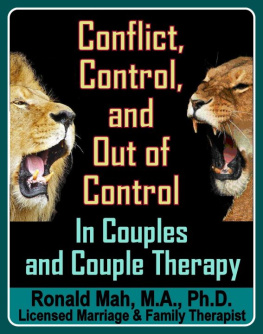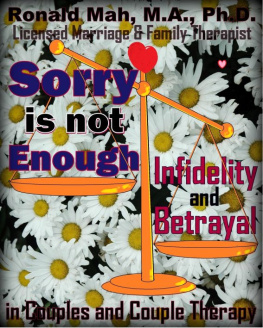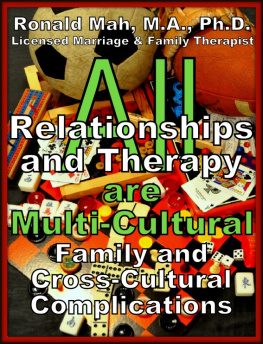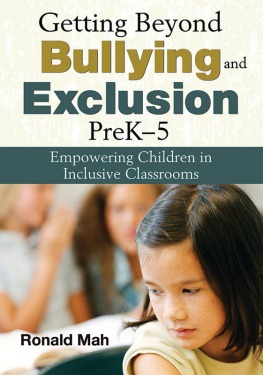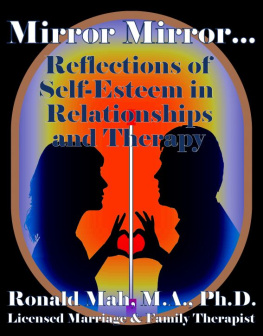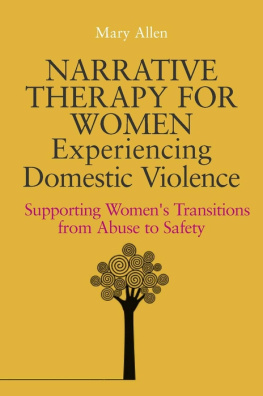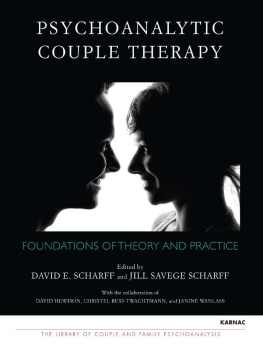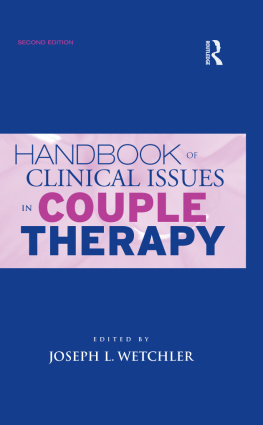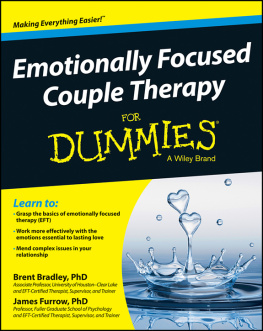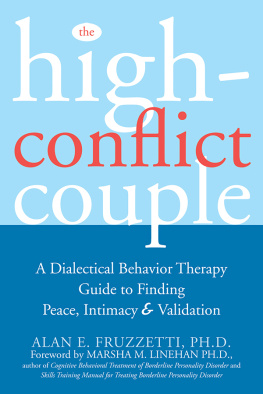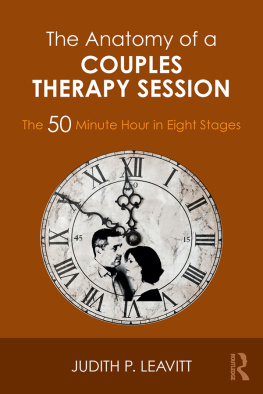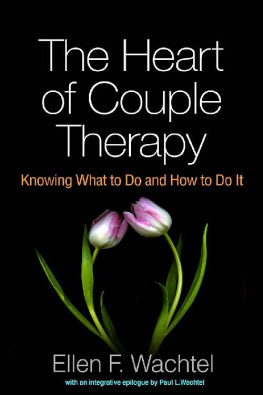Conflict, Control, and Out of Control inCouples and Couple Therapy
Ronald Mah, M.A., Ph.D., L.M.F.T.
Published by Ronald Mah at Smashwords
Copyright 2013 Ronald Mah
Ronald Mah's website- www.ronaldmah.com
Smashwords Edition, License Notes
This ebook is licensed for your personalenjoyment only. This ebook may not be re-sold or given away toother people. If you would like to share this book with anotherperson, please purchase an additional copy for each recipient. Ifyou're reading this book and did not purchase it, or it was notpurchased for your use only, then please return to Smashwords.comand purchase your own copy. Thank you for respecting the hard workof this author.
****
Linked Table of Contents
****
Abstract
C onflict, Control,and Out of Control in Couples and Couple Therapy addresses thecontinuum of assertion, aggression, and abuse between partners. Thetherapist is guided how to promote appropriate assertiveness andaggression while avoiding crossing the boundary of abuse. Conflictis intrinsic to most couples, but relative control vs. getting outof control varies greatly resulting in relationship health ordysfunction. The therapist is directed how to guide partners how todeal w/ anger and frustration- learning how to fight fairly andproductively to prevent emotional abuse.
T he book discussesconceptual vs. practical distinctions between normal couple therapyand domestic violence therapy. Therapist boundaries and choices toengage or not in domestic violence therapy become functionallyproblematic when intimate partner violence is unanticipated butuncovered in sessions. The therapist will learn how to assess for,manage, and treat partners when emotional reactivity becomesemotional abuse- a focus of normal couple therapy; when verbalabuse predicts physical abuse; and when domestic violence isrevealed.
T he book discussesattachment, bullying dynamics, cultural models, social informationprocessing, verbal fluency, empathy, peer, cultural, and gendermodels, same sex relationships, disinhibition, stressors,dialogical processing, hypersensitivity and hypervigilance, andcharacterological issues including paranoid and antisocialpersonality disorder affecting partners' conflict, control, and outof control issues. The therapist will learn to shift couple therapystrategies and goals when noting distinctions between reactiveaggression, abuse, and instrumental aggression more characteristicof sociopathic partners. Beyond fundamentally altering treatment toavoid perpetuating abuse, the therapist must identifycounter-indications for conducting couple therapy.
****
**A uthors Note:Other than public figures or people identified in the media, allother persons in this book are either composites of individuals theauthor has worked with and/or have been given different names andhad their personal identifying information altered to protect andrespect their confidentiality.
Chapter 1: ASSERTION AND AGGRESSION INCOUPLES
D irk and Madelinewere in their early forties. They have been married for eightyears. They lived together for a couple of years prior to marriage.They had met when they both were working at a real estate firm.They said that their relationship had become strained over the pasttwo years. They were not close as they were before. They admittedthat they were going through a lot of stress. They were gettinginto a lot of conflict. Madeline's had taken a leave from work togive birth and care for the baby for a few months. The plan was tohave her mother care for the baby during the day so Madeline couldreturn to work. However, grandma got sick and couldn't provide thecare. In fact, she ended up needing Madeline's help to deal withher daily functioning. So, the short break from work had become amore or less permanent situation. It was going on four years sincethe second paycheck came. Georgie was a high-maintenance kid too.She had been colicky and remained extremely active and moody. Dirkwas the primary- actually the only breadwinner for the family.However, with the real estate crash, he had gone from a big earnerto struggling. Before the housing market tanked, everyone mademoney but now it was pretty rough. A couple of years ago with theirfinancial issues and grandma's medical problems and physicaldecline, they had moved in with Madeline's mother.
"W e don't have muchtime anymore for doing things as a couple," complained Dirk. "Ifthere's any open houses or meetings, I have to take them. I can'tbe choosy like I could do when houses were selling like pancakes.Sometimes, I have to be gone for a couple of days or a week. I'vebeen trying to get into some import export stuff and that'scentered in another city. When I'm home, I'm not around much, andthen I'm gone. Getting back in sync with the household is tough.And Madeline gets and stays stressed. There's always appointmentsor something with her mom or with Georgie. It's just not the sameanymore." Madeline said, "We have trouble talking. Ourcommunication is messed up. If we talk, it's usually Dirkcriticizing how I take care of Georgie and my mom. He doesn't likehow the house looks. It's too messy it's not neat enough the foodis boring. He's hardly around so he doesn't really help, but hesure can complain about what I do or don't do. He gets so mad.Maybe if he was home more or did more when he was, we could havemore of a Beaver Cleaver home!" "See?" Dirk asked the therapistrhetorically. "That's what I have to deal with. I work my ass offin this crappy real estate market, and she doesn't give me anycredit. You think I like being gone so much from home? I'd ratherbe home watching soap operas too. She should know how hard it isout there, but no! 'How come you're late? Why do you need to begone so long? I want this Georgie needs that!' It doesn'tstop."
D irk and Madelinehad tried couple therapy before: once for about four months andanother time for over a year. In the first therapy experienceshortly after the baby was born, the therapist worked with them onimproving their communication skills. They learned to set betterboundaries and clarify what each wanted from the other. They toldthe therapist, they did a lot of problem solving about settingrules about chores, expectations, and parenting. It worked wellenough so that along with ongoing financial stress they terminatedtherapy. After a year, when they were fighting more intensely, theydecided to try a different therapist. Both Dirk and Madeline knewhow to "behave" but admitting having trouble following through.They tired to be more assertive, but that often degenerated intoaggression. Sometimes, it became hurtful. With the secondtherapist, they wanted to get to the "core" of their problems.During this therapy, they learned more about how their respectivefamily experiences and gender role models from their parents wererepeated in their relationship. Dirk said it was all well and goodbut "So we figured out both our dads were assholes, but we stillfought. Yeah, we I could see how it was like my or her parentsfighting again but we did it anyway. Knowing we I was repeatingwhat my dad did only made me feel guilty and more frustrated."Madeline also felt the family-of-origin stuff was useful, but saidthe last couple therapist let Dirk dominate the sessions. And shehad enough of him trying to control her at home. She did not feelshe was heard in therapy or at home.
I n the session, Dirkgot visibly angry when Madeline complained about him. She glancedat him while she spoke to the therapist. She seemed to pull backfrom pressing her case her perspective. The therapist fed back toDirk and Madeline that Madeline seemed to hold back when she sawDirk get upset. The therapist asked if something like this happenedat home. Dirk started and Madeline confirmed that when they gotinto an argument, Dirk would get angry and animated. His facehardened, his voice raised, and his body tensed. Madeline usuallybacked off, sometimes physically leaving the room if she could.Then Dirk would go after her, not just physically but alsoemotionally. "Sometimes, I just can't deal with it" Madelinestarted to tear up, "and get I getemotional." This made Dirkmadder. He said, "She falls apart and whatever is my issue getsshut down." "And," Madeline snapped, "he keeps at me. He won't justgive it give me a break. It's abusive." When the therapist askedwhat Dirk keeping at her meant, Madeline said he kept hectoringher. When asked how aggressive he was, Madeline and Dirk both saidit was mostly verbal and they never really got physical.

